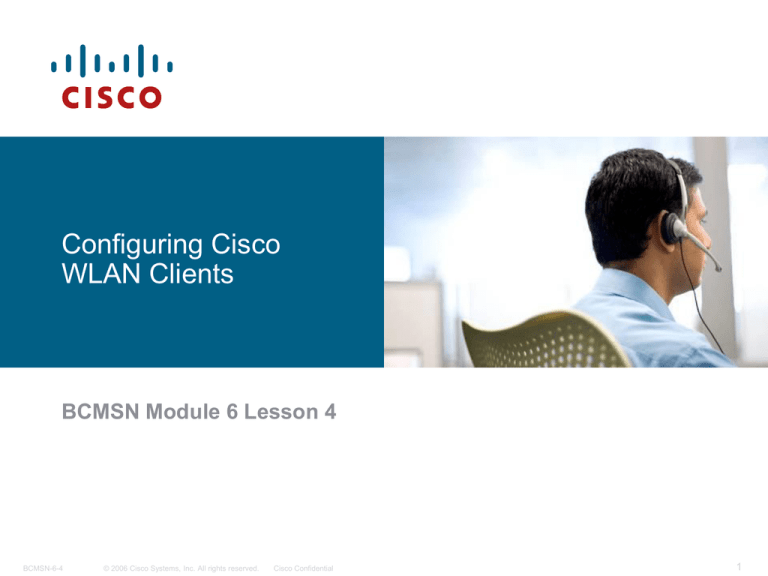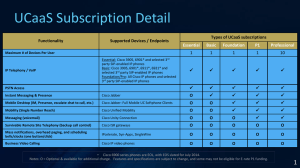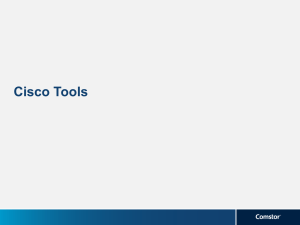
Configuring Cisco
WLAN Clients
BCMSN Module 6 Lesson 4
BCMSN-6-4
© 2006 Cisco Systems, Inc. All rights reserved.
Cisco Confidential
1
Objectives
Install the Cisco WLAN client adapter and the Cisco Aironet Desktop Utility
Use the Cisco ADU to configure the Cisco 802.11a/b/g WLAN client
adapter
Use the Cisco ADU for diagnostics and troubleshooting of the WLAN client
adapters
Use the Cisco Aironet Site Survey Utility to get information about available
WLANs
Describe the WLAN configuration through Windows XP
Describe the Cisco ACAU
Describe the Cisco WLAN IP Phone
Describe the features and benefits of the CCX program
BCMSN 6-4
© 2006 Cisco Systems, Inc. All rights reserved.
Cisco Confidential
2
Identifying and
Installing WLAN
Client Adapters
BCMSN 6-4
© 2006 Cisco Systems, Inc. All rights reserved.
Cisco Confidential
3
Cisco 802.11a/b/g WLAN Client Adapters
802.11a/b/g dual-band client adapters
CardBus or PCI card
Supports all three current standards
Supported operating systems
Windows 2000 and Windows XP
3 Components:
Radio
Antenna
LEDs
BCMSN 6-4
© 2006 Cisco Systems, Inc. All rights reserved.
Cisco Confidential
4
Software Components
The client adapters have two major
software components: a driver and client
utilities.
Driver must be installed before the
adapter can be used.
Client Utilities include Aironet Desktop
Utility (ADU) and Aironet System Tray
Utility (ASTU).
BCMSN 6-4
© 2006 Cisco Systems, Inc. All rights reserved.
Cisco Confidential
5
Adapter LEDs
Status LED (green)
Activity LED (amber)
Condition
Off
Off
Client adapter is not
receiving power
Blinking slowly
Off
Client adapter is in power
save mode
Off
Client adapter has
awakened from power save
mode.
On
Off
Client adapter is scanning
for the wireless network
for which it is configured.
Off
On
On
Alternating blink:
Blinking slowly
Blinking quickly
BCMSN 6-4
© 2006 Cisco Systems, Inc. All rights reserved.
Blinking slowly
Client adapter is
associated to an AP
(infrastructure mode) or
client (ad hoc mode).
Blinking quickly
Client adapter is
transmitting/receiving data
to AP or client.
Cisco Confidential
6
Client Adapter Installation
Adapter card should be installed before drivers and
utilities.
CardBus adapter is keyed and can only be inserted on
way.
Configuration profiles for CardBus cards are tied to the
slot. Always insert the card into the same slot.
PCI card adapters should be installed with the PC
power off.
If the Windows “Found New Hardware Wizard”
appears, click Cancel. Software for the card will be
installed in the next step.
BCMSN 6-4
© 2006 Cisco Systems, Inc. All rights reserved.
Cisco Confidential
7
Client Adapter Software Installation
Client Adapter driver and utilities are located
in a single file.
Aironet Desktop Utility (ADU) used with a/b/g
cards. Aironet Client Utility (ACU) used with
legacy cards.
Download the latest software from
Cisco.com.
BCMSN 6-4
© 2006 Cisco Systems, Inc. All rights reserved.
Cisco Confidential
8
Cisco Aironet Desktop Utility Installation
BCMSN 6-4
© 2006 Cisco Systems, Inc. All rights reserved.
Cisco Confidential
9
Install Cisco Aironet Site Survey Utility
BCMSN 6-4
© 2006 Cisco Systems, Inc. All rights reserved.
Cisco Confidential
10
Choose Configuration Tool
BCMSN 6-4
© 2006 Cisco Systems, Inc. All rights reserved.
Cisco Confidential
11
Cisco Aironet System Tray Utility
Only used when third-party
tool is selected for
management.
BCMSN 6-4
© 2006 Cisco Systems, Inc. All rights reserved.
Cisco Confidential
12
Reboot!
After the installation process completes, you will be
prompted to reboot your machine.
It is strongly recommended that you reboot your
machine.
After rebooting the Windows “Found New Hardware”
utility may appear. Click through the screens to allow
the wizard to install the software for the adapter.
If your network does not use DHCP, you will need to
configure your adapter with appropriate IP parameters.
BCMSN 6-4
© 2006 Cisco Systems, Inc. All rights reserved.
Cisco Confidential
13
Self Check
1. What are the 2 varieties of Cisco wireless client
network adapters?
2. What are the 2 major software components
associated with the WLAN client adapter?
3. Why should cardbus client adapters be inserted into
the same slot each time?
4. Why does Cisco recommend using ADU?
BCMSN 6-4
© 2006 Cisco Systems, Inc. All rights reserved.
Cisco Confidential
14
Using ADU
BCMSN 6-4
© 2006 Cisco Systems, Inc. All rights reserved.
Cisco Confidential
15
ADU – Current Status
BCMSN 6-4
© 2006 Cisco Systems, Inc. All rights reserved.
Cisco Confidential
16
Advanced Status Information
BCMSN 6-4
© 2006 Cisco Systems, Inc. All rights reserved.
Cisco Confidential
17
ADU: Profile Management
BCMSN 6-4
© 2006 Cisco Systems, Inc. All rights reserved.
Cisco Confidential
18
ADU: Main Profile Screen
BCMSN 6-4
© 2006 Cisco Systems, Inc. All rights reserved.
Cisco Confidential
19
Available Networks
BCMSN 6-4
© 2006 Cisco Systems, Inc. All rights reserved.
Cisco Confidential
20
ADU: New Profile
BCMSN 6-4
© 2006 Cisco Systems, Inc. All rights reserved.
Cisco Confidential
21
ADU: Security Settings
BCMSN 6-4
© 2006 Cisco Systems, Inc. All rights reserved.
Cisco Confidential
22
ADU: Advanced Settings
Selectively choose wireless modes to decrease
association time.
BCMSN 6-4
© 2006 Cisco Systems, Inc. All rights reserved.
Cisco Confidential
23
ADU Diagnostics: Advanced Statistics
Used predominately during troubleshooting
BCMSN 6-4
© 2006 Cisco Systems, Inc. All rights reserved.
Cisco Confidential
24
ADU Diagnostics: Adapter Information
Driver version
Adapter MAC
address
BCMSN 6-4
© 2006 Cisco Systems, Inc. All rights reserved.
Cisco Confidential
25
ADU Troubleshooting
BCMSN 6-4
© 2006 Cisco Systems, Inc. All rights reserved.
Cisco Confidential
26
Self Check
1. How can you ensure that the name and IP address of
the access point are shown when selecting the
“Advanced” tab?
2. How many profiles does the ADU profile manager
allow you to create and save for your client adapter?
3. What does a key icon in the “Available Infrastructure
and Ad Hoc Networks” window indicate?
4. How many SSIDs can be configured for a single
profile in the ADU?
BCMSN 6-4
© 2006 Cisco Systems, Inc. All rights reserved.
Cisco Confidential
27
Other
Features
BCMSN 6-4
© 2006 Cisco Systems, Inc. All rights reserved.
Cisco Confidential
28
Cisco Aironet System Tray Utility
Associated with
Excellent/Good
Connection
Associated with
Fair Connection
Associated with
Poor Connection
Radio Disabled
Associated not
authenticated
Not associated
BCMSN 6-4
© 2006 Cisco Systems, Inc. All rights reserved.
Cisco Confidential
29
Cisco Aironet Site Survey Utility
BCMSN 6-4
© 2006 Cisco Systems, Inc. All rights reserved.
Cisco Confidential
30
Cisco Aironet Site Survey Utility (Cont.)
BCMSN 6-4
© 2006 Cisco Systems, Inc. All rights reserved.
Cisco Confidential
31
Windows XP WLAN Configuration
BCMSN 6-4
© 2006 Cisco Systems, Inc. All rights reserved.
Cisco Confidential
32
Comparison of Windows XP and Cisco
ADU
BCMSN 6-4
Feature
Windows XP
Cisco ADU
Configuration Parameters
Limited
Extensive
Create profiles
Yes
Yes
Enable/disable radio
No
Yes
Static WEP
Yes
Yes
LEAP
No
Yes
EAP-TLS or PEAP
Yes
Yes
Status window
Limited
Extensive
Troubleshooting
No
Yes
Statistics
No
Yes
© 2006 Cisco Systems, Inc. All rights reserved.
Cisco Confidential
33
Aironet Client Administration Utility
(ACAU)
Creates file with profiles and settings
Profiles imported during the installation of ADU and
firmware
For AIR-CB21AG and AIR-PI21AG
Installs across network
Encrypted setup files
Windows 2000 and Windows XP only
BCMSN 6-4
© 2006 Cisco Systems, Inc. All rights reserved.
Cisco Confidential
34
Aironet Configuration Administration
Utility (ACAU)
Easy binary
configurations
for security and
utility
BCMSN 6-4
© 2006 Cisco Systems, Inc. All rights reserved.
Cisco Confidential
35
Cisco Wireless IP Phone
For workers who need to communicate
while moving about their workplace or
campus
Same features as Cisco wired IP Phones
Graphical, menu-driven user interface
Multiline appearance (up to six
extensions)
Phone book with speed dials
LEAP security
Auto VLAN configuration and
Cisco CallManager registration
BCMSN 6-4
© 2006 Cisco Systems, Inc. All rights reserved.
Cisco Confidential
36
Cisco Compatible Extensions (CCX)
No-cost licensing of technology for use in WLAN
adapters and devices
Independent testing to ensure interoperability with
Cisco infrastructure
Marketing of compliant products by Cisco and product
suppliers under “Cisco Compatible” brand
BCMSN 6-4
© 2006 Cisco Systems, Inc. All rights reserved.
Cisco Confidential
37
Cisco Compatible Extensions
Cisco Compatible client
devices
Features
Assured compatibility
with 300+ devices
Standards-based
Enhanced security,
mobility, and
performance
Benefits
Accelerates innovation
Supports diverse
enterprise applications
Ensures multivendor
interoperability
BCMSN 6-4
© 2006 Cisco Systems, Inc. All rights reserved.
Cisco Confidential
http://www.cisco.com/go/ciscocompatible/wireless
38
Cisco Compatible Extensions Features
V1
Security
VLANs and QoS
V2
WEP
IEEE 802.1x
LEAP
Cisco TKIP
Multiple
SSIDs/VLANs
on AP
V3
PEAP-GTC
WPA
WPA2
EAP-FAST
NAC (wireless)
EAP-TLS
PEAP-MSCHAP
eDCF
Wi-Fi Multimedia
(WMM)
MBSSID
BCMSN 6-4
© 2006 Cisco Systems, Inc. All rights reserved.
Call Admission
Control (CAC)
U-APSD
TSPEC CAC
Voice metrics
Voice over IP
Performance and
Management
V4
AP-assisted
roaming
CCKM with
LEAP
RF scanning
and reporting
Transmit
power sync
Cisco Confidential
CCKM with EAPFAST
Proxy ARP
information
element
Single sign-on:
LEAP, EAP-FAST
CCKM with other EAP
types
AP-directed roaming
Location
Keep Alive link test
39
Self Check
1. What is the Aironet Client Administration Utility
(ACAU)?
2. What is the Aironet System Tray Utility (ASTU)?
3. What is the Cisco Compatible Extensions (CCX)
program?
BCMSN 6-4
© 2006 Cisco Systems, Inc. All rights reserved.
Cisco Confidential
40
Activity
Learn how to share an Ethernet-based Internet connection with
wireless computers using an ad hoc wireless network.
The Internet Connection Sharing (ICS) feature of Microsoft®
Windows® XP allows you to share a single Internet connection
with multiple computers. Built-in support for IEEE 802.11 wireless
LANs (WLANs) allows you to create an ad hoc wireless network.
These two features can be used together to share a wired Internet
connection.
This article describes how to quickly and easily use Windows XP to
share a wired Internet connection with other WLAN computers:
http://download.microsoft.com/download/a/1/e/a1efd204-bcac-4b0e8d3a-d16aadbc1dbb/AdHocICS.doc
BCMSN 6-4
© 2006 Cisco Systems, Inc. All rights reserved.
Cisco Confidential
41
Summary
The installation wizard for the Cisco 802.11a/b/g WLAN client
adapter installs driver and utilities.
The Cisco 802.11a/b/g client adapter is configured via Cisco ADU.
Cisco ADU can be used for troubleshooting the client adapter.
The Cisco Aironet Site Survey Utility provides information about
available WLANs.
Cisco ADU provides more features than Windows XP for the Cisco
client adapter configuration.
Cisco ACAU provides preconfiguration of WLAN profiles for
software distribution.
The Cisco wireless IP Phone provides integration of IP telephony
into WLANs.
The CCX program enhances WLAN features for WLAN adapters
from multiple vendors.
BCMSN 6-4
© 2006 Cisco Systems, Inc. All rights reserved.
Cisco Confidential
42
Resources
Cisco Compatible Extensions
www.cisco.com/go/ciscocompatible/wireless
Cisco Wireless LAN Software (requires CCO login)
http://www.cisco.com/kobayashi/sw-center/sw-wireless2.shtml
Microsoft TechNet Wireless Networking site
http://www.microsoft.com/technet/network/wifi/default.mspx
BCMSN 6-4
© 2006 Cisco Systems, Inc. All rights reserved.
Cisco Confidential
43
Q and A
BCMSN 6-4
© 2006 Cisco Systems, Inc. All rights reserved.
Cisco Confidential
44
BCMSN 6-4
© 2006 Cisco Systems, Inc. All rights reserved.
Cisco Confidential
45







